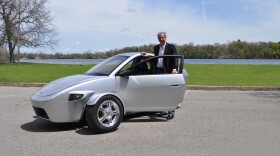The state legislature has approved a bill to change Michigan's motorcycle laws. The change will let Elio (pronounced EE-lee-oh) Motors sell a three-wheeled car in the state, without requiring buyers to take a motorcycle safety test, known as a motorcycle endorsement.
The "Elio" is technically a motorcycle because it has three wheels and weighs less than 1,600 pounds. Nonetheless, it is a car, with car safety features like airbags.
Joel Sheltrown of Elio Motors says Michigan's old law would have required buyers of the Elio to take a motorcycle safety test - which teaches things like, "the throttle is on the right handlebar" and you should "lean into a curve."
"Leaning into a curve isn't going to do you any good on a three-wheeled vehicle because it handles like a car handles," says Sheltrown, and it's why, when trying to do a figure eight in the car, "we run over the cones and we hit the white lines."
Sheltrown says he thinks other states with similar laws will have modified them by the time Elio Motors plans to start production of the Elio in late 2014.
His main concern is the five states that require drivers of three-wheeled vehicles to wear a helmet.
He says those laws must be changed by the time the Elio is for sale, because wearing a helmet in a car obscures the person's vision and hearing, and the weight of the helmet also has the potential to cause severe neck damage in an accident.
The cars will be built at a former GM plant in Louisiana. Elio Motors says they will cost $6,800 each, and the company anticipates the vehicle will get a five-star safety rating.
The company plans to make the cars affordable for low-income buyers, by letting them pay off the car each time they fill up the gas tank.
A special credit card will charge buyers an extra fee on top of the price of the gas. The theory is, because the car is so fuel-efficient (84 MPG highway, 49 city), drivers won't even notice the extra fee - since they'll essentially be paying the same price for gas as they would in a regular vehicle.




